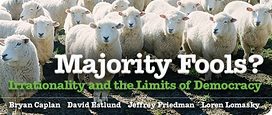I argued that since political decisions are usually also moral, it’s not clear that the better educated (or the economically educated) will, as a group, be especially qualified. The reason is that it’s far from clear that the class of the (economically) educated won’t also have other traits that might narrow and damage their moral vision. I gave the examples of race, class, gender, and religion, knowing full well that Caplan, as he points out in his reply, wisely controlled for those in his research. The point I made was that we now know to control for those particular factors, but it’s often hasty to suppose that history is over. It would not be unreasonable to worry that there might well yet be other factors that travel with higher education that skew the sample enough to outweigh the beneficial effects of the extra education.
I don’t say whether or not there is strong reason to have those doubts, but only that it would not be unreasonable to have them given the history of these matters. So whether or not I have the doubts, some reasonable citizens could. That alone is enough to make it unjustified to expect all citizens to see the fact that decisions were made by college graduates or economists as a justification for the authority or legitimate enforcement of the decisions.
Caplan might think: “look, whatever other reasonable people might think, you and I know the economists know best. So they should get more votes.” But I believe this is a fallacy—the expert/boss fallacy, as I call it. It’s the same kind of reasoning as the patent non sequitur: “I’m right about what the law should be. Therefore I should rule.” You might be correct, but what makes you boss?
What’s missing is some premise or principle that ties expertise to authority in that way. How about this: whoever actually knows best what should be done is permitted to make and coercively enforce laws accordingly? That isn’t very plausible. In order to know whether the Catholics had a right to rule, we’d just need to decide whether they were correct. Or, if they were powerful enough, only they would have to decide, and we would be spared the trouble. This doesn’t seem to come out right. But substitute “economists” for “Catholics” and the form of the argument doesn’t change, and doesn’t improve.
I think that your moral/political expertise is only a justification for your political authority if your claim of expertise is generally acceptable. Not to everyone, however crazy or vicious, but to some wide range of divergent views that are neither crazy nor vicious even though many will be incorrect (call these the “reasonable” views or something, and work would need to go into defining its boundaries, of course). This would explain why even if Catholics are right about what the laws should be, that doesn’t make them legitimate bosses over the rest of us. Same for economists. I conjecture that no invidious comparisons between the supposed political knowers and the non-knowers would pass the test of general acceptability. And yet, I don’t think this ruins the whole concern with making substantively good political decisions, a concern I share with Caplan. But I’ll keep this post short(-ish), and come back to that.

